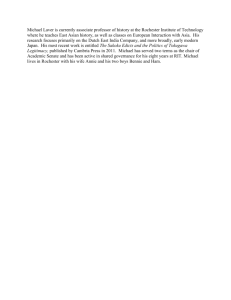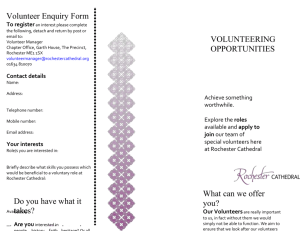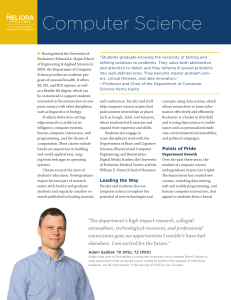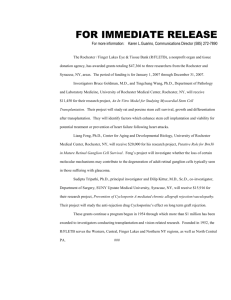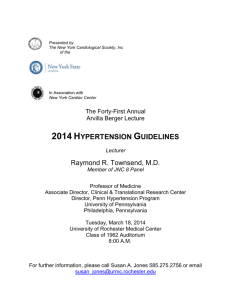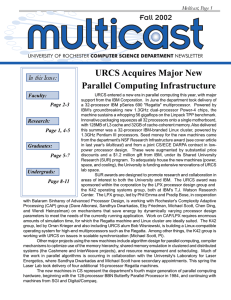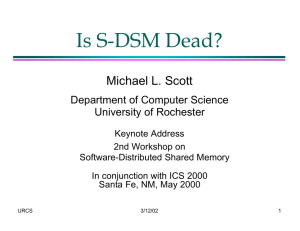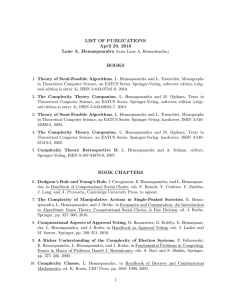URCS Wins 2004 Goergen Award Fall 2004 In this issue:
advertisement
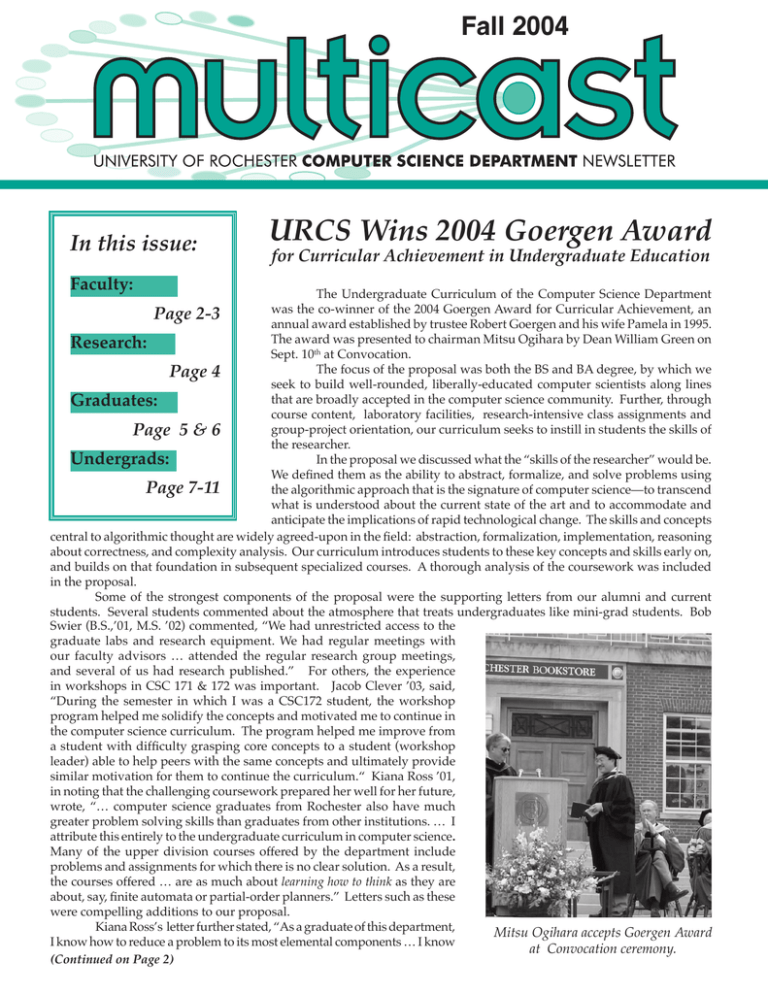
Fall 2004 In this issue: Faculty: URCS Wins 2004 Goergen Award for Curricular Achievement in Undergraduate Education The Undergraduate Curriculum of the Computer Science Department was the co-winner of the 2004 Goergen Award for Curricular Achievement, an Page 2-3 annual award established by trustee Robert Goergen and his wife Pamela in 1995. The award was presented to chairman Mitsu Ogihara by Dean William Green on Research: Sept. 10th at Convocation. The focus of the proposal was both the BS and BA degree, by which we Page 4 seek to build well-rounded, liberally-educated computer scientists along lines that are broadly accepted in the computer science community. Further, through Graduates: course content, laboratory facilities, research-intensive class assignments and group-project orientation, our curriculum seeks to instill in students the skills of Page 5 & 6 the researcher. In the proposal we discussed what the “skills of the researcher” would be. Undergrads: We defined them as the ability to abstract, formalize, and solve problems using Page 7-11 the algorithmic approach that is the signature of computer science—to transcend what is understood about the current state of the art and to accommodate and anticipate the implications of rapid technological change. The skills and concepts central to algorithmic thought are widely agreed-upon in the field: abstraction, formalization, implementation, reasoning about correctness, and complexity analysis. Our curriculum introduces students to these key concepts and skills early on, and builds on that foundation in subsequent specialized courses. A thorough analysis of the coursework was included in the proposal. Some of the strongest components of the proposal were the supporting letters from our alumni and current students. Several students commented about the atmosphere that treats undergraduates like mini-grad students. Bob Swier (B.S.,’01, M.S. ’02) commented, “We had unrestricted access to the graduate labs and research equipment. We had regular meetings with our faculty advisors … attended the regular research group meetings, and several of us had research published.” For others, the experience in workshops in CSC 171 & 172 was important. Jacob Clever ’03, said, “During the semester in which I was a CSC172 student, the workshop program helped me solidify the concepts and motivated me to continue in the computer science curriculum. The program helped me improve from a student with difficulty grasping core concepts to a student (workshop leader) able to help peers with the same concepts and ultimately provide similar motivation for them to continue the curriculum.“ Kiana Ross ’01, in noting that the challenging coursework prepared her well for her future, wrote, “… computer science graduates from Rochester also have much greater problem solving skills than graduates from other institutions. … I attribute this entirely to the undergraduate curriculum in computer science. Many of the upper division courses offered by the department include problems and assignments for which there is no clear solution. As a result, the courses offered … are as much about learning how to think as they are about, say, finite automata or partial-order planners.” Letters such as these were compelling additions to our proposal. Kiana Ross’s letter further stated, “As a graduate of this department, Mitsu Ogihara accepts Goergen Award I know how to reduce a problem to its most elemental components … I know at Convocation ceremony. (Continued on Page 2) Multicast, page 2 Faculty News and Notes Sandhya Dwarkadas has received the IBM Faculty Partnership Award for the 2nd year in a row. Chris Brown and Brian Madden (researcher in Dermatology and advisee of CB many years ago for his CVS degree) are working on a patent application on the subject of asymmetric resolution stereo for real-time segmentation, especially for use in small devices with limited room for traditional two-camera stereo. A. E. Papathanasiou and Michael L. Scott took the Best Paper award for their paper “Energy Efficient Prefetching and Caching” at 2004 USENIX Annual Technical Conference, Boston, MA, JuneJuly, 2004. Michael Scott was named a Senior Member of the IEEE this past spring. Chris Brown and Randal Nelson are working closely with the local business PLe Corp. to license and apply computer vision code written at UR to image analysis and surveillance tasks. Henry Kyburg (with Mariam Thalos) edited the publication “Probability is the Very Guide of Life,“ Open Court, 2003. The M & S lock-free concurrent queue, developed by Maged Michael and Michael Scott in 1995 is now part of the Java Standard Library (as of the February 2004 J2SE 1.5 [“Tiger”] release). Lane Hemaspaandra and Leen Torenvliet have published a book, Theory of Semi-Feasible Algorithms (Springer-Verlag, ISBN 3-540-42200-5), 2003. (continued from page 1) how to identify nuance in statements and determine the subsequent differences that arise in their implication. As a graduate of this department I know how to ask the right questions about a problem: where precisely is the complexity of this problem? What assumptions does my approach make and are these reasonable? Is this problem reducible to something I can solve? If there seems to be an inherent complexity to every approach I conceive of, what can I conclude about the nature of the problem itself? Can I generalize this phenomenon? Learning to ask these questions … learning how to approach overwhelmingly difficult problems … these are all skills that I use constantly in my career, that I find invaluable to my career and that I developed solely as a result of the kind of curriculum implemented in the Department of Computer Science.” Enthusiastic feedback from so many of our alumni verifies that our curriculum is in fact instilling the skills of the researcher in our students. This research approach to coursework has not only had a positive effect on our graduates after they leave Rochester for industry or academia, but it has also created an environment conducive to independent research at the undergraduate level. From the chart above, it is evident that there has been dramatic growth in the number of undergraduates with research experiences in the last several years. These opportunities, combined with our research-style coursework, created a winning combination. We were happy to accept the Goergen Award for Curricular Achievement! Multicast, Page 3 Rochester Connection at ACL Computational linguists with a Rochester connection gathered recently in Barcelona, Spain at the 42nd Annual Meeting of the Association for Computational Linguistics. Pictured at the banquet are: Front row (L-R): Donna Byron (Ph.D. ’02), The Ohio State University, Mary Swift, URCS Research Scientist, Diane Littman (Ph.D. ’86), University of Pittsburgh. Back Row (L-R): Janet Hitzeman (Ph.D. ’93), Mitre Corp., Joel Tetreault, URCS Ph.D. student, Massimo Poesio (Ph.D. ’94), University of Essex , Daniel Gildea, URCS Faculty , Scott Stoness, URCS Ph.D. student, Bob Swier (M.S. ’02), Ph.D. student at the University of Toronto and David Traum (Ph.D. ’95), USC. Not pictured but in attendance at the conference were Amanda Stent (Ph.D. ’01), SUNY Stony Brook and Eric Ringger (Ph.D.’00), Microsoft Corp. New Grants and Awards Daniel Gildea received an NSF Grant to study domain-independent semantic interpretation. Ted Pawlicki was awarded an NSF/SURF grant for an undergraduate to study at NIST during the summer of 2004. Chris Brown received a NYSTAR/Kodak grant through CEIS for scene classification of consumer images. Mitsu Ogihara has been awarded a NYSTAR/ Xerox grant through CEIS for intelligent document analysis tools. Michael Scott received a grant from Sun Microsystems for scalable synchronization for the JAVA virtual machines project. Sandhya Dwarkadas was awarded an NSF grant for operating system strategies for energy and resource aware adaptation. Lane Hemaspaandra received an NSF/ITR grant for richer understanding of the complexity of election systems. Multicast, page 4 Theory Group at Rochester Our theory group consists of three faculty members. Lane Hemaspaandra, who has been an NSF Presidential Young Investigator, serves on the editorial board of the journals Computational Complexity, Information Processing Letters, Journal of Computing and Information, and Journal for Universal Computer Science and is the complexity theory columnist for the ACM Computing Research Repository. He has published ninety journal papers and book chapters. He coauthored the book The Complexity Theory Companion with Mitsunori Ogihara,” coauthored the book Theory of Semi-Feasible Algorithms with Leen Torenvliet, and co-edited the book Complexity Theory Retrospective~II with Alan Selman. Mitsunori Ogihara joined the department following a faculty position at Tokyo’s University of Electro-Communication, and was awarded an NSF CAREER grant. He is a member of the editorial boards of Journal of Computing and Information and Theory of Computing Systems. He coauthored the book The Complexity Theory Companion with Lane Hemaspaandra. He has chaired the UR Computer Science Department since 1999. Joel Seiferas has wide-ranging interests spanning algorithms and complexity theory. He is the author of the “Machine-Independent Complexity” chapter of the Handbook of Theoretical Computer Science. He has published about twenty-five journal papers and book chapters. These faculty members pursue an active and intensive research effort in theoretical computer science, focusing on an algorithmic approach to computational complexity and its applications in a variety of fields. Lane’s interests remain broad, and during the past half decade he has collaborated with about thirty researchers. Recent papers by Lane, joint with URCS students and visitors, have shown that all context-free languages can be accepted in polynomial time with absolutely no space overhead, have proven that all superlinear inverse problems are coNP-hard, have yielded new broad-brush tools to classify problem complexity, have given strong evidence for the power of quantum computing, and have established that for many tasks regarding polynomialtime functions algebraic properties can be added without any computational cost. Lane recently gave an invited address at the DCFS ‘04 conference on the last topic. During the past two years, Lane’s Ph.D. students Mayur Thakur and Chris Homan have graduated and moved to tenure-track faculty positions at U. Missouri-Rolla and RIT, respectively, Lane has been appointed to the Computational Complexity editorial board, and the new book by Lane and Leen Torenvliet, Theory of Semi-Feasible Algorithms, was published by Springer-Verlag. During the past two years, three students of Mitsu’s graduated and started their new career: Alina Beygelzimer, Yinhe Cheng, and Tao Li. Both Alina and Yinhe are research scientists at IBM, Alina at T. J. Watson and Yinhe at Austin. Tao Li is an Assistant Professor of Computer Science at Florida International University. Mitsu’s research interests cover many different areas, including information retrieval, machine learning, data mining, bioinformatics, and complexity theory. His recent papers were presented in such conferences as ACM SIGIR (information retrieval), ICML (machine learning), ICDM (data mining), IEEE CIKM (information and knowledge management), IEEE ICASSP (audio, speech, and signal processing), ISMIR (music information retrieval), and MFCS (mathematical foundations of computer science). Joel has been working on sorting networks, including generalization of Batcher ’s bitonic method and easily teachable expositions of the Ajtai-Komlos-Szemeredi sorting network. With CS graduate student Ming Zhong he has been working on teachable expositions of the PCP theorem. He has been supervising Ming on his current work on peer-topeer network algorithms, including routing, load balancing, and membership-management algorithms, in collaboration with CS faculty member Kai Shen. In addition to working with our own students, the theory group has collaborated extensively with other researchers inside and outside of the University of Rochester. One of our close collaborations is with the theory group at the Rochester Institute of Technology: Professors Edith Hemaspaandra, Roger Gaborski, Chris Homan, Staszek Radziszowski, and Ankur Teredesai. In addition to multiple ties through student advising and joint research projects, the two groups sponsor the fortnightly Rochester Theory Seminar (affectionately known as the Theory Canal Seminar, due to our proximity to the historic Erie Canal). Our faculty members have also participated in international collaboration grants with computational complexity research groups in Germany and Japan. Lane’s work on computational politics which started during his Bridging Fellowship at the University of Rochester’s Department of Political Science, involves researchers from six other schools, and Mitsu has begun collaboration with the Data Mining group at Xerox on document information retrieval. In the past few years, his collaborations with other UR faculty members, included researchers from the Department of Biology, the Center for Aging and Developmental Biology (in which he has a secondary appointment), and the Center for Functional Genomics. The web page contains full details, background, and publications lists for many of our major theory projects, in particular: • • • • • • • • • Complexity: Reductions, Resources, and Robustness Computational Politics Counting Classes Cryptography, One-Way Functions, and Pseudorandom Generators DNA Computing Downward Collapses and Query Order Knowledge Discovery and Data-Mining Semi-Feasible Algorithms Sets of Low Information Content Multicast, Page 5 Meet our newest Ph.D.’s David D. Ahn The Role of Situations and Presuppositions in Restricting Adverbial Quantification University of Amsterdam DeQing Chen Multi-Level Shared State and Application-Specific Coherence Models AskJeeves.com Yinhe Cheng Computational Approaches to Cancer Diagnosis and Protein Interaction Inference IBM Austin Myroslava O. Dzikovska A Practical Semantic Representation for Natural Language Parsing University of Edinburgh Tao Li Knowledge Discovery in Text and Temporal Data Florida International University Umit Rencuzogullari Dynamic Resource Management for Parallel Applications in an Autonomous Cluster of Workstations VMWare Nathan R. Sprague Learning to Coordinate Visual Behaviors Kalamazoo College Chunqiang Tang Data Sharing and Information Retrieval in Wide-Area Distributed Systems IBM T. J. Watson Kumar Mayur Thakur General Tools for Determining Problem Complexity University of Missouri, Rolla Chen Yu Embodied Language Learning in Humans and Machines Indiana University, Bloomington Multicast, page 6 Graduate Alumni News and Notes Altman, Art (MS, ’87) writes that he works for the Electric Power Research Institute (EPRI) in Palo alto, CA. He manages EPRI’s work in valuation and risk management of energy derivative contracts. Armading, Tom (grad student in the mid 70s) has retired and is living in Hawaii. Chen, Xiangchuan (Samuel) (MS, ‘02) writes that he is working for EasyCom Corporation in Nanjing as Director of Operation & Maintenance. He’s planning to be there for another year, and if anyone will be visiting Nanjing, he would like you to call him. (Peg Meeker has the phone numbers.) Ciaraldi, Mike (MS, ’90) had two plays (Captions and Two Graves) produced as part of Worcester Polytechnic Institute’s New Voices 22 theatre festival in April 2004, and one of the plays will be presented at Noreascon 4, the World Science Fiction Convention in Boston this September. Core, Mark (PhD, ‘00) has moved from the University of Edinburgh to the University of California’s Institute for Creative Technologies. Cortes, Corinna (PhD, ’94) is at Google Labs on the east coast (NYC). Cottrell, Gary (PhD, ’85) was awarded a 5-year $3.2M NSF IGERT training grant (“Vision and learning in humans and machines”) that supports 15 students a year. Denber, Michele (MS, ‘80) retired as a Senior Research Scientist at Eastman Kodak Co. in May, 2003. She has just added an instrument rating to her private pilot’s license and is now working on a commercial pilot license and a multi-engine rating. Floyd, Rick (PhD, ‘89), who was identified on the alumni web site as being semi-retired, writes that now he’s really retired; no “semi” about it. Gafter, Neal (PhD, ‘90) is another alum now at Google Labs, in Mountain View, CA. Goddard, Nigel (PhD, ’92) is now CEO of Axiope LTD, a spinout from the University of Edinburgh that provides collaborative software to help biomedical research institutions and scientist track, manage and share data. Gradischnig, Klaus (MS, ‘79) has been promoted to Managing Consultant at Detecon, Inc. in Reston, VA. Hinkelman, Elizabeth (PhD, ‘90) is now at Galactic Village Games (in Massachusetts), working on a massively multi-player online strategy game. Lyles, Bryan (PhD, ‘83) has accepted a position with Telcordia (a division of SAIC) as Executive Director of Mobile Networking Research, and is moving to Piscataway, NJ. McCallum, Andrew (PhD, ‘96) at U. Mass, recently became the recipient of an IBM Faculty Partnership Award from T. J. Watson Research Lab, and a paper he co-authored with three others on Interactive Information Extraction was given an Honorable Mention award at AAAI 2004. Meltzer, Cliff (MS, ‘77) is back at Cisco Systems as SVP running the Network Management Technology Group. Miller, Brad (MS, ’86) and Chung Hee Hwang are still working on AI projects at Raytheon, but have transferred from Massachusetts to the Naval Integration Center in Portsmouth, RI. O’Riain, Colm (MS, ’95) is working at Electronic Arts in Redwood City, CA. Parker, Clinton (MS, ’79) works at Eurotherm Drives International. He and his wife Deborah have four daughters: Chelsea, Vanessa, Alexis and Marissa. Poesio, Massimo (PhD, ’94) is now a Reader at the University of Essex, and leader of the NL Group there. Schudy, Bob (PhD, ‘82), chief scientist for eIQnetworks, writes that his son Devon is also working for eIQnetworks, and his son Warren is starting his senior year at Worcester Polytechnic Institute. Slayden, April (MS, ’02) has been promoted from Research Associate to Software Engineer at HP Labs where she has received three patents and has recently joined the (new) Audio Communication and Entertainment group. Smith, Ed (PhD, ’82) is now a web developer at Lunar Logic, Inc, in Eugene, Oregon which does all college-level online classroom technology for Thomson textbooks (called: iLrn). Also, he was to have been shooting a short film in August. Swier, Robert (MS, ’02) reports that he’s starting the third year of his Ph.D. program at U. Toronto and is enjoying Canada. Turner, Paul (MS, ’88) is working at Network Inference in Belmont, CA (and notices that there are a lot of alums in that area!) Veenstra, Jack (PhD, ’95) is also at Google Labs, in Santa Clara, CA. Williams, Graeme (PhD, ’80) is now a sales engineer at IBS America (www.ibs-us.com), the local subsidiary of a German software company. His elder daughter Sarah has a Howard Hughes Research Fellowship for the summer, and his younger daughter Paige was to enroll at UMBC for the fall. Yamauchi, Brian (MS, ‘90), a Lead Roboticist at iRobot Corporation in Burlington, MA, is the PI for the Wayfarer Project, a $1.3 M R&D program funded by the U.S. Army that will provide iRobot’s PackBot with the capability to perform fully autonomous urban reconnaissance tasks. Also, he was recently selected for inclusion in the next edition of Marquis’ Who’s Who in Science and Engineering. Zaki, Mohammed (PhD, ‘98) was recently promoted to Associate Professor at Rensselaer Polytechnic University. Zimand, Marius (PhD, ‘96) now an Associate Professor at Towson University, has finished the book Computational Complexity—A Quantitative Perspective, and it has been published by Elsevier in the North-Holland Mathematics Studies series. For details, see http:// www.elsevier.com/wps/find/bookdescription.cws_home/703042/ description#description. Please send updates to Peg Meeker at meeker@cs.rochester.edu Multicast, Page 7 URCS Research Highlight: Adaptive Systems The URCS systems group is headed by a small but cohesive group of faculty from Computer Science and the department of Electrical and Computer Engineering: Chen Ding, Sandhya Dwarkadas, Wendi Heinzelman, Michael Huang, Michael Scott, and Kai Shen. While our research spans areas from wireless networking to synchronization algorithms, we focus here on our work in adaptive systems. Technological trends over the past few years have led to a dramatic increase in microprocessor and system complexity. Both the explosion in system complexity and the need for energy efficiency are driving a trend toward adaptive systems: hardware that can be dynamically reconfigured, and software that adjusts the hardware together with the offered workload to realize overall system goals for performance and energy efficiency. Our research in this area includes program analysis and optimization, architectural innovations, and runtime and operating system strategies. It has produced a large number of influential publications, including Best Paper award recipients in IPDPS’01, IEEE MICRO’03, and Usenix’04. For more information on these and other projects, please visit ``http://www.cs.rochester.edu/research/systems’’. Program Behavior Analysis and Prediction Program execution analysis has shown that most programs exhibit significant behavior variation at both coarse and fine granularities. Sudden changes in behavior, measured by different metrics, tend to occur together, at the boundaries between program phases. Our work in this area focuses on identifying program phases and predicting their behavior. The techniques we have explored include pure run-time approaches that divide the execution into fixed time intervals, as well as hybrid approaches that identify program phases using knowledge gleaned from traces of prior executions. A pioneering innovation in our work is the use of reuse distance, which measures the volume of information accessed between consecutive accesses to the same individual datum. Using data reuse distance as a signal, we use wavelet filtering to locate sharp changes in reuse behavior, which represent transitions to different phases. Compared with existing methods, our method predicts spatial and temporal locality of memory reference behavior with orders of magnitude larger granularity and orders of magnitude higher accuracy. We have shown its benefits in adaptive cache resizing and memory remapping. Architectural Exploitation of Program Behavior The push for higher frequencies in today’s general-purpose processors is resulting in smaller portions of the chip being accessible in a single cycle with each generation of technology. Wire delays have become the dominant factor in overall on-chip latency, while power consumption and heat dissipation have become the limiting factor for clock rate and system complexity. Current outof-order microprocessors choose a single design point for all on-chip structures, targeted at overall best performance for a range of applications. Unfortunately, this one-size-fits-all approach results in inefficient resource utilization and both energy and performance inefficiencies for individual applications and application phases. Several recent projects at Rochester, including joint work with David Albonesi, have leveraged technology trends to dynamically adapt the underlying processor to the application’s needs, with the goal of both performance and energy efficiency. Examples include the complexity-adaptive processor (CAP), the multiple clock domain (MCD) processor, and, more recently, the dynamically tunable clustered multithreaded architecture (DT-CMT). Clustering explicitly takes technology trends into account to allow a faster clock: structures within a cluster are accessible within a cycle while cross-cluster communication requires additional cycles. This type of architecture exposes the communication/parallelism tradeoff within the processor and allows both thread-level and instruction-level parallelism to be exploited. We are exploring various mechanisms by which this tradeoff can be managed dynamically. System-Level Exploitation of Application Behavior For any adaptive self-tuning system to work well, all components of the system must cooperate in an integrated manner. We are exploring several avenues in exploiting knowledge of application behavior within the operating system, including resourceaware thread scheduling and the scheduling of I/O requests. For resources that can be ``scaled back’’ gradually (e.g., processors with dynamic voltage scaling), we seek to smooth out demand, to leverage the energy efficiency associated with steady, sub-peak operation. For resources with non-operational low-power modes (e.g., ``spundown’’ disks and power-cycled Wi/Fi cards), we deliberately increase the ``burstiness’’ of demand, to create long periods of low-energy idle time. For notebook computers, our changes to the Linux I/O system have been shown to save up to 80% of the energy used by the hard Please consider the Departdisk. ment of Computer Science and UR in your giving plans. For information on how to make a gift, please contact the University’s Gift Office at 585-275-8602 or email us at giftoffice@admin.rochester.edu We are also exploring support for the growing class of data-intensive online servers. Such servers access large disk-resident datasets while serving many clients simultaneously. Performance is affected by many factors, including application data access patterns, storage device characteristics, and operating system strategies. Our goal is to identify the performance impact of various OS mechanisms (caching, prefetching, I/O scheduling, and memory management) and to develop strategies that will maximize performance for data-intensive online servers. We are focusing in particular on highly concurrent workloads, and on OS mechanisms that adapt automatically to specific applications and storage devices. Multicast, page 8 A Road Not Taken Blumberg follows his own path In 1997, when Josh Blumberg graduated from UR with a double degree in Computer Science and Cognitive Science, the dot com industry was still on the rise. His classmates accepted jobs at major corporations, consulting firms and small software houses at ever increasing salaries. Josh, however, wasn’t looking for the “get rich quick” corporate gig. At graduation, his plans were uncertain, but he hoped to crew a sailboat over to Israel, climb some high peak, or explore the world. 1997 alumnus Josh Blumberg hiking in the Cognitive science and computer science offered something of a unique opportunity for Cascade Mountains - Summer 2004 Josh. His course track of “Learning” in Cog Sci allowed him to incorporate the two seemingly divergent fields of education and computer science by looking at the way these disciplines perceive learning. While at UR, he volunteered as a tutor for city school children to apply some of his newly acquired knowledge. Josh’s interests weren’t limited to CSC and education, however. His love of the outdoors inspired him to study for a semester in the desert southwest, backpacking and living under the stars while getting college credit for field study courses from a west coast university. So how does a computer scientist resolve the conflict between the daily confines of the programmer’s cubicle and the open skies of the great outdoors? Do as Josh did, and find a willing employer! In his case, he found a company that would allow him the flexibility of working for several months, and then leaving for an undetermined period of time. During the months of his walkabouts, Blumberg was an Outward Bound counselor and spent time hiking around the U.S and visiting friends on the west coast. After returning multiple times to his programming job in Maryland, Josh decided it was time to reach for his true calling, teaching. Here he could combine his knowledge of computer science and his interest in learning. He researched to find the best private high school in the country, sent in his application to Eagle Rock School in Colorado, crossed his fingers and waited. He was accepted for a one year position as an intern and resident computer lab technician, packed his backpack and moved to the mountains of Colorado. His days involved teaching an occasional course, running the computer labs, and hiking with the students at this Honda-supported school near the Rocky Mountain National Park. Blumberg has settled now at The Rivers School, a private 6th-12th grade park-like campus outside of Boston. He has always been interested in alternative education and the teaching of logical reasoning through computer science. At Rivers, he teaches AP Computer Science and manages the school’s network. The school’s philosophy includes ample time for outdoor teaching activities, sports and music. In his teaching, Josh has noticed that his background as a CSC major sets him apart from many high school teachers of AP Computer Science, who are often math teachers with little computer science background. When asked what advice Josh would give CSC students interested in pursuing a teaching career, he suggested students should look at private schools as they have more flexibility and control over their programs than public schools. Certification to teach computer science varies from state to state, making it difficult to qualify for positions in local school districts. Private schools often have more computer science electives for their students and don’t need to follow rules for state certification. Though there are difficulties sorting out the regulations for high school teaching, Josh believes that CSC majors have great skills to share with the future generation of computer scientists. Blumberg’s career choices quickly dispel the notion that a computer science degree means you’ll be locked in a cubicle staring at a computer screen for the rest of your life. Josh has found his UR degrees have allowed him to climb to new heights, both professionally and recreationally. Multicast, Page 9 Undergraduate Alumni News Anderson, Darrell ‘96 is presently a senior engineer doing large scale system development at Google. Atwood, Ben ‘03 “I’m at EMC outside Boston working closely with a team writing software for a new storage networking product.” Baird, Tyrone ‘01 works for IBM in Raleigh, NC and will enroll in grad school to get his Master’s in Aerospace Engineering. He got his civilian pilot’s license and was accepted to be a pilot for cargo planes in the US Air Force. Bakas, Yoel ‘01 “I took at job with a small company called Zmed in MA about 2 years ago. Since taking the job, we have gone through an acquisition and are now a part of the largest producer of linear accelerators for cancer treatment in the world, Varian Medical Systems. I work for a division that does image-guided radiosurgery & radiotherapy and travel the world showing physicians our technology.” Bijlani, Rahul ‘02 “I’m currently working at BioDiscovery Inc., a bioinformatics software firm in El Segundo, CA (Los Angeles) as a Regional Accounts Manager for Europe and the East Coast. We make software for microarray image/ data analysis and data management. The job includes sales, business development, distributor relations, consulting on custom work etc. It’s fun and includes travel to fun places. Haven’t written a line of code in a long, long time. I live in Playa Del Rey, a little beach town south of Marina Del Rey, sharing a house with three other people, and sharing a large part of my income with the California government. The most recent highlight in my life was finally becoming a US citizen, which was pretty cool. Contrary to speculation, even though I visited India recently, I did not return with an arranged marriage. Although L.A. has its moments I am looking forward to moving back East.” Brill, Ingrid ‘02 is still at NASA-Goddard, working on the Aqua & Aura flight software. She has recently taken on maintenance of their Oracle web-interactive database that tracks all of their “Configuration Change Requests” to these three spacecraft. Brown Meleo, Christine ‘99 After graduating from UR, she entered the Air Force, attended Texas A & M in a Basic Meteorology program, and then became the “Wing Weather Officer”. She left the military in November of 2002 and is now enrolled in a graduate program at Fitchburg State College in Massachusetts. She will graduate with an MBA in May 2005. Buckley, William ‘02 “I am working at EMC in the Boston area doing embedded systems development for their midrange storage platforms. I’m also taking classes towards a Master’s in Computer Software Engineering with the hope of completing the degree by the summer of 2005.” Calarese, Diana ‘03 is currently enrolled in grad school at the University of Florida, doing a co-op at IBM in Tampa for several months and hopes to go to South America for a year sometime soon so she can keep up her Spanish major and be completely fluent. Camara, Ross ‘04 was recently hired by Chesapeake Systems in Baltimore, MD after spending the summer with family in Hawaii. Chang, Lewis ’02 is a Software Quality Assurance Engineer at EMC in MA. Clever, Jacob ’03 “I am a participant in a leadership development program within the Operations/ Manufacturing division of BAE Systems. It’s a 3 year development program where I receive leadership training, reimbursement for advanced education and 3 unique job rotations. My first rotation is as a Process Engineer. The entire program does not directly involve my skills as a computer scientist. However I have noticed it does utilize all of the problem solving skills and work ethics I’ve obtained through my work at URCS.” Dagen-Lubich, Justin ’02 began work at a security systems company in Pittsford, NY. He will be in the Professional Engineering Services group doing custom programming and script writing. Farmer, Grant ‘04 started working at Epic Systems in Madison, WI this fall as a software developer. Forney, Zebulon ’02 began his studies in the MBA program at Purdue University this fall. Frankel, Josh ‘03 was named Basic Life Support Provider of the Year as a member of Henrietta Ambulance. Frueh, Andrew ‘03 “I started in RIT’s Master of Fine Arts program in Computer Animation in the fall and I’m working part time at Truth-n-Beauty.com. I also won the “Best Computer Animation” for my film “A Fish Tale” at the Philadelphia Video Festival this year.” Gerega, Aaron ’99 while working for Lockheed Martin (Syracuse), he spent about 2 months in Turkey last year installing traffic management systems. Golden, Alex ’03 is working for Burlington Coat Factory EDI. Hamilton, Jeff ‘01 “Last August I moved to Austin, TX. My girlfriend Amy (also a UR Alumnus) started a PhD program in school psychology at UT, and I have been working remotely for PalmSource. After a long search in early May we bought a house and moved throughout Multicast, page 10 (Undergraduate News continued from page 9) the month.” 1996.” Harris, Blake ‘03 – is working for Ameriquest Mortgages in the Los Angeles area, as a business analyst dealing with business process re-engineering & data analysis. Marcus, Fred ’01 - is working as a software consultant for TelePro, in the Chicago area. He writes, “I travel quite a bit to do installations, babysit controllers and networks, or fix things. So far I’ve had work related travel to NY, NC and Sardinia, Italy.” Heavey, Brendan ’02 – has been working at SUNY Buffalo in Database Development and Bioinformatics. He will begin a matriculated grad program in biostatistics this fall. Keck, Jason ‘03 – has been working at UR Lab for Laser Energetics, and will be returning to campus this fall to pursue a Master’s in Material Science. Kenney, Jeff ’01 – is an officer in the U.S. Navy and is currently Operations Officer at Fort Meade, MD. McCarthy, Eric ‘03 - is working at DesertNet in Tucson, AZ doing software development. McCusker, James ‘99 – is in charge of the entire user experience for TurboWorx’s products, including user interface, making the user community a good resource, and improving the product support process. Kim, Hyong-Youb ’01 – is currently a graduate student at Rice University. He earned his Master’s in April 2003 and is continuing towards a doctoral degree. Mohan, Shailan ‘99 – “I’m heading a team that is implementing enterprise level applications for the Dept. of Transportation’s Office of Airline Information in Washington, DC.” Kleene, Morgan ’03 – is a Ph.D. student at U. of Maryland, College Park, and hopes to specialize in algorithms. Morgan, Justin ‘04 - is working at Epic Systems in Madison, Wisconsin as a software engineer. Kwon, Andrew ’02 - is teaching computers and English in China at Wuhan University of Technology. He says “I guess all those semesters TAing paid off!” Muderick, Aaron ‘98 - “My wife Elizabeth and I had a daughter, Sara, on December 6, 2003.” Lehr, Michael ’01 – after working for Lockheed Martin for several years writing software for various projects, Mike will be heading back to school full-time for a Master’s in Engineering in Computer and Information Sciences (AI/ Computer Vision) and working 24 hours a week, with Lockheed footing the bill! Leung, Hector ‘00– is an Information System Technologist at Northrop Grumman IT in Rome, NY. Li, Yanjun ’02 – has moved back to China and is working in Hangzhou for a subsidiary of Zhe Da University, Insigma Innovation Technologies. Liviekis, Edward ’01 – is enjoying his job as a game programmer for Midway Home Entertainment. Luis, Cristina ‘01 – left in April for U. S. Air Force Officer’s Training School and will have the title 2nd Lt., USAF with a job title of Navigator Trainee. Cristina guesses that her CS background will help her with problem solving and quick calculations. Mackenroth, Adam ‘96 – “I was married in 2001, lost our first child (still-born) in 2003, expecting second in August. I’m working as a programmer for a telecommunications service provider in Molalla, the same job I’ve had since Nettleton, Matthew ’03 – is working in Genoa, NY for a small company writing software for the retirement industry. Ramachandran, Ajit ‘96 - “On the personal front, since arriving here at HP/Agilent, I have been promoted to the post of career engineer. In October of 2000, I presented a paper co-authored by me and a senior engineer here, on behalf of Agilent Technologies at the European Microwave Conference in Paris, which was well-received, and published as part of the proceedings of that conference. In December 2000, I got engaged, and married in August 2001. My wife too, is a software engineer. We purchased our first home earlier this year, in January 2004, in Santa Rosa, California.“ Rau, Alex ’99 - is a software architect at an insurance company, answering questions about web development and acting as the interface to IBM and Microsoft. Ross, Kiana ‘01 - is now in the Mathematics Ph.D. program at U. of Washington. Sankar, Nandini ‘97 - “I relocated to India in July 2003, to open up GLobeOps offices in India. I currently oversee its India Operations, across various divisions like Operations, Fund Accounting, Technology, and Derivatives.” Multicast, Page 11 (Undergraduate News continued from page 10) Schmid, Jonathan ‘03 Jonathan has decided to postpone robotics graduate school for the immediate future. He is currently looking for a computer job in NYC for next year, and plans to seek an entrepreneurial MBA in the near future. Siegel, Jacob ’97 is architecting software systems and doing algorithm and data design for Info Directions in Webster, NY. Spears, Steffin ’01 Steffin is a linux systems administrator for the Department of Physics and Astronomy at UR. Stern, Mia ’94 after completion of her Ph.D. at UMass, Amherst, Mia took a post-doc position at IBM. Subsequently, she moved to a job at IBM Software doing user interface development with Rational Software. Tam, Jonathan ’02 is a Business Data Analyst at CIPI in Burlington, MA. Van Durme, Ben ‘01 “I graduated from CMU with a Master’s in Language Technologies. In September I began a PhD program at Univ.ersity of Rochester (yes, Rochester ... ) in both CS and (hopefully) Linguistics. I am currently in the process of remodeling a house I bought in the 19th Ward, which I’ll be sharing with Craig Harman ‘00.” Wexler, James ‘03 “I am designing and coding in C++ for a radar project at Raytheon in the Boston area. I plan on possibly going to grad school for my Master’s in computer science in about a year, as long as I can get Raytheon to pick up the tab.” Wood, Lauren ‘03 was working as an intern for Intel in Chandler, AZ. As of early November, she will be starting as a full-time software engineer in their Software Solutions Group, working with Enterprise Applications and optimizing them to work on Intel Architecture. Zlotnikov, Stanislav ’02 is working in database development at Lehman Brothers in NYC. Send updates to Marty Guenther at marty@cs.rochester.edu Kudos to the Class of 2004! Gautam Altekar Michael Aronson Theodore Bever Michael Bevilacqua-Linn Seema Bhopale John Cairns Ross Camara Jonathan Cheng E. Scott Cragg Ross D’Eredita David Easwaran Grant Farmer Warren Fong Joseph Gester Alex Gondarenko Daniel Gross David Hedges Rodney Hilton Paul Hortiatis Brian Immerman Michael Isman Kristaps Johnson Brian Kim Erin Kimball Thomas Kollar Peter LaRossa Philip Lee Justin Levinson Lucas McCarthy David McClosky Evan Merz Justin Morgan Long Nguyen Jonathan Norwood Peter Ordal Maksim Orlovich Karim Oussaef Alexa Phillips Albert Robinson Andrew Ross II Charles Shin Ahren Studer Jonathan Tomer Fanghui Ye Charles Zhang Multicast, page 12 Multicast NONPROFIT ORG. U.S. Postage PAID Permit No. 780 A newsletter from the Dept. of Computer Science University of Rochester PO Box 270226 Rochester, NY 14627-0226 “Multicast” is published annually by the Department of Computer Science, University of Rochester, Rochester, NY (www.cs.rochester.edu). We welcome your suggestions, contributions & participation. Email ideas to the editor at multicast@cs.rochester.edu Editor/Designer.......................................Marty Guenther Faculty Liaison........................................... Mitsu Ogihara Contributors........................Mitsu Ogihara, Chris Brown, Sandhya Dwarkadas, Marty Guenther Undergraduates in the News Tom Kollar ’04, Geoff Dawson ’07 (both CSC) and Eric Lunin (Environmental Engineering ‘04) competed in 3 episodes of the DIY Network’s Robot Rivals this past spring. In repeated appearances, the team competed against Worcester Polytechnic Institute, University of Iowa and Union College respectively, designing a grass-cutting robot, a rodent-wrangling robot and a vegetable-picking robot. The team represented UR well, advancing to the semi-finals before being defeated. Gautam Altekar ‘04 was a finalist in the Computing Research Association’s 2004 Outstanding Undergraduate Award Program. Albert Robinson ’04 received Honorable Mention.
